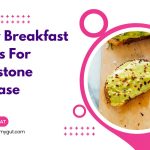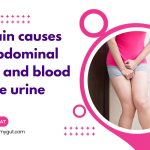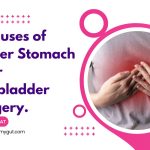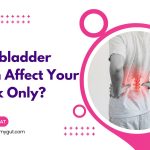Do Antacids & PPIs (as Omeprazole) Help Gallbladder Pain? Gastroenterologist Explains.
Our content is not intended nor recommended as a substitute for medical advice by your doctor. Use for informational purposes only.
Antacids and PPIs (as omeprazole) are medications that reduce stomach acid. Antacids and PPIs are not effective for gallbladder pain. However, they can help ease the gastric upset associated with gallbladder diseases.
Gallbladder pain is primarily controlled by analgesics such as NSAIDs and opioids. NSAIDs as Ibuprofen, ketorolac, and diclofenac are the first-line treatments for gallbladder pain (biliary colics).
Do Antacids help gall bladder pain?
We use antacids (such as aluminum hydroxide) for:
- Gastritis.
- GERD.
- Peptic ulcer disease.
Antacids are not used to ease gallbladder pain (biliary colic). However, Your doctor may prescribe antacids with a gall bladder disease in special circumstances:
- Associated gastritis, acid reflux, or peptic ulcer disease.
- Atypical gallbladder symptoms such as heartburn, isolated epigastric pain, or nausea.
Gallbladder attack (biliary colic) is usually in the form of pain in the upper right abdomen. The pain may spread to the epigastric area and the right back.
Pain starts gradually, builds up to reach its maximum intensity within 30-60 minutes. Then, it starts to fade gradually. Unfortunately, this pattern of gallbladder pain is not relieved by antacids such as:
- Aluminum hydroxide gel (Alternagel, Amphojel)
- Calcium carbonate (Alka-Seltzer, Tums)
- Magnesium hydroxide (Milk of Magnesia)
- Gaviscon, Gelusil, Maalox, Mylanta, Rolaids.
- Pepto-Bismol.
Do PPIs (as omeprazole) help gallbladder pain?
As antacids, the same goes for PPIs. PPIs are a group of more powerful acid-reducing medicines. They are primarily used for (reference):
- GERD (chronic acid reflux).
- Gastritis.
- H. pylori infection.
- Peptic ulcer disease.
- Functional dyspepsia.
- Barret’s esophagus.
PPIs (like antacids) don’t help gallbladder pain. However, your doctor may prescribe them if there is associated heartburn, vomiting, or gastric upset.
Also, your doctor may prescribe NSAIDs (as ibuprofen or ketorolac) to reduce gallbladder pain. PPIs (as omeprazole) can be added to prevent NSAID-induced gastritis and peptic ulcers.
So, We do use PPIs in gallbladder disease. However, the primary aim of PPI is to help associated stomach symptoms and prevent NSAID complications, not to treat gallbladder pain.
Also, Neither PPI nor antacid are used routinely for gallbladder disease. Their use is subject to your associated symptoms and peptic ulcer risk. Don’t take antacids or PPIs (as omeprazole) for gallbladder pain unless prescribed by your doctor.
Why PPIs and Antacids won’t help gallbladder pain?
The most common cause of gallbladder pain is gallstones. Gallbladder pain is a result of increased pressure inside your gallbladder as follows (reference)
- Gall bladder contraction: often, foods (particularly fatty or large meals) trigger the contraction of your gallbladder.
- The contraction of the gallbladder forces the stone inside the gallbladder against its opening.
- The stone causes temporary obstruction of the bile outflow from the gallbladder.
- This combined contraction and obstruction lead to an increase in the pressure inside your gallbladder.
- The pain starts and builds up as the pressure increases. Finally, it may reach extreme levels and spreads to the back and the mid-upper stomach area.
- After 30-60 minutes, the gallbladder starts to relax again.
- The stone falls back into the cavity, relieving the obstruction.
- As a result, the pressure gradually decreases inside the gallbladder. And the pain resolves gradually.
Antacids and PPIs don’t affect gallbladder contractions; they only act as anti-acids. The pain from gallstones is not related to acid. That’s why antacids and PPIs don’t help gallbladder pain.
So, what helps the gallbladder pain?
During the attack of biliary colic (gallbladder pain), your doctor may prescribe certain medications to help gallbladder pain relief:
1. Non-steroidal anti-inflammatory drugs (NSAIDs):
NSAIDs are the first-choice medications to control biliary colic. Studies proved that they are more effective than antispasmodics for biliary colics (reference).
The frequently used medications are:
- Ibuprofen (Advil®).
- Ketorolac.
- Diclofenac.
- Tenoxicam.
Besides their analgesic action, NSAIDs have an important advantage; they act as an anti-inflammatory medication. The anti-inflammatory action decreases the risk of acute cholecystitis.
Acute cholecystitis is a complication of gallstones. Stones can permanently obstruct the gallbladder. The obstruction traps bile inside the gallbladder, which triggers inflammation and infection.
Acute cholecystitis causes prolonged gallbladder pain, fever, and vomiting.
Two important tips:
- NSAIDs are sold as an OTC medication. However, please don’t use them for gallbladder pain without medical consultation. In addition, NSAID doses for gallbladder pain may be different from the available OTC doses.
- Paracetamol (Tylinol®) is a common NSAID. However, we seldom use it for gallbladder pain due to its weak effect.
2. Opioid analgesics:
Opioid analgesics are good prescription medications for gallbladder pain. Clinical trials showed that they are at least equally effective for gallbladder pain as NSAIDs (reference).
Your doctor may prescribe an opioid narcotic as meperidine to control the gallbladder pain.
3. Antispasmodics
Antispasmodics has a weak effect on biliary colics. Your doctor may prescribe them as an add-on to NSAIDs or meperidine to help with gallbladder pain. We don’t use antispasmodics alone for the control of biliary colics.
4. Preventing future attacks of gallbladder pain.
Surgical removal of the gallbladder (cholecystectomy) is indicated if you have symptomatic gallstones. Unless you are unfit for surgery, cholecystectomy is the best option to prevent future attacks and complications.
Small meals, less fatty, and less sugary foods help prevent recurrence of the gallbladder meal.
- Evidence-based
- Written by a doctor.







